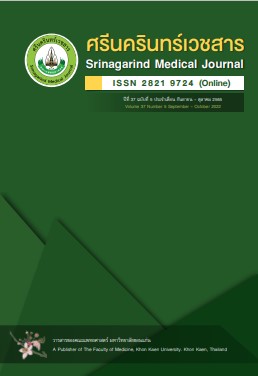สารสกัดผลลูกไหนมีผลต่อการป้องกันการลดลงของความจำในหนูแรทตัวเต็มวัยที่ถูกเหนี่ยวนำให้แก่ชราด้วยดีกาแลคโทส
Prunus domestica L. Crude Extract Protects against Reductions of Memory in D-Galactose-Induced Aging in Adult Rats
Abstract
หลักการและวัตถุประสงค์: การลดลงของความจำเป็นพยาธิสภาพหนึ่งที่พบได้มากในผู้สูงอายุ การเสื่อมสภาพของสมองขณะที่อายุมากขึ้นสัมพันธ์กับภาวะเครียดออกซิเดชันซึ่งเหนี่ยวนำอนุมูลอิสระที่เพิ่มขึ้น การที่เซลล์ถูกทำลายและการตายของเซลล์ประสาท การศึกษาในสัตว์ทดลองพบว่าดีกาแลคโทส (D-galactose; D-gal) มีผลทำให้เกิดการลดลงของวงจรประสาทและการสร้างเซลล์ประสาทในชั้น SGZ ของ DG ในสมองส่วนฮิปโปแคมปัส ส่งผลให้สูญเสียความจำ Prunus domestica L. (PD) หรือลูกไหนเป็นผลไม้ที่มีสารประกอบประเภทฟีโนลิกและฟลาโวนอยด์ การศึกษาก่อนหน้านี้ได้รายงานผลของสารสกัดลูกไหนมีประโยชน์ต่อการเรียนรู้และความจำ ดังนั้นการศึกษาครั้งนี้มีวัตถุประสงค์เพื่อศึกษาผลของสารสกัดลูกไหน ต่อภาวะความจำบกพร่องในหนูที่ถูกเหนี่ยวนำให้เกิดภาวะความชราด้วย D-gal
วิธีการศึกษา: หนูแรทเพศผู้สายพันธุ์ Sprague Dawley ถูกแบ่งออกเป็น 8 กลุ่ม ได้แก่ vehicle, D-gal, PD 75, PD 100, PD 150, D-gal + PD 75, D-gal + PD 100 และ D-gal + PD 150 โดย D-gal (50 มก/กก.) ให้โดยการฉีดเข้าช่องท้อง และ PD (75, 100 และ 150 มก/กก.) ให้โดยการป้อนทางปาก วันละครั้ง เป็นเวลา 8 สัปดาห์ ในระหว่างการให้สารหนูถูกชั่งน้ำหนัก หลังจากนั้นหนูถูกทดสอบความจำด้วยการทดสอบ novel object location (NOL) และ novel object recognition (NOR)
ผลการศึกษา: ไม่มีความแตกต่างกันอย่างมีนัยสำคัญทางสถิติ (p>0.05) ของน้ำหนักและการเคลื่อนไหวของหนูทุกกลุ่ม ส่วนการทดสอบความจำ NOL และ NOR กลุ่ม vehicle, PD 75, PD 100, PD 150, D-gal + PD 75, D-gal + PD 100 และ D-gal + PD 150 สามารถแยกความแตกต่างอย่างมีนัยสำคัญทางสถิติ (p<0.05) ระหว่างวัตถุวางในตำแหน่งเก่าและใหม่ หรือวัตถุเก่าและวัตถุใหม่ ในทางตรงข้ามกลุ่ม D-gal ไม่สามารถแยกได้ในทั้งสองการทดสอบ
สรุป: การศึกษาในครั้งนี้แสดงว่า สารสกัดลูกไหน (75, 100 และ 150 มก/กก.) มีผลที่เป็นประโยชน์ดีต่อการลดภาวะความจำบกพร่องที่เกิดจากการเหนี่ยวนำโดย D-gal ได้
คำสำคัญ: ความจำ, ลูกไหน, ดีกาแลคโทส, ชราภาพ
Background and Objective: A decline in memory is the most common pathology of aging. Brain degeneration during aging is related to upregulating the reactive oxygen species (ROS) levels, which induce oxidative stress, neuronal damage, and neuronal apoptosis. In animal studies, D-galactose caused down-regulation of neuronal circuitry and neurogenesis in the subgranular zone (SGZ) of the hippocampal dentate gyrus (DG) resulting in memory impairment. Prunus domestica L. (PD) or look-nai is a fruit that contains phenolic compounds and flavonoids. Previous studies have reported the beneficial effects of PD extract on learning and memory. Therefore, this study aimed to study the effect of PD extract on memory impairment in aging rats induced by D-gal.
Methods: Male Sprague Dawley rats were divided into 8 groups: Vehicle, D-gal, PD 75, PD 100, PD 150, D-gal + PD 75, D-gal + PD 100, and D-gal + PD 150. D-gal (50 mg/kg) and PD (75, 100 and 150 mg/kg) were given by intraperitoneal injection and digestive gavage once a day for 8 weeks, respectively. Rats was weighed during the experiment. Then, memory was tested using the novel object location (NOL) and novel object recognition (NOR) tests.
Result: There were no statistically significant differences (p>0.05) in body weight and locomotor activity among the groups. For the NOL and NOR memory tests, the vehicle, PD 75, PD 100, PD 150, D-gal + PD 75, D-gal + PD 100, and D-gal + PD 150 groups were able to discriminate between the objects placed at the familiar and novel locations or the familiar and novel objects (p<0.05). On the other hand, the D-gal group was unable to distinguish in both tests.
Conclusion: This study demonstrates that PD (75, 100 and 150 mg/kg) had a beneficial effect to ameliorate D-gal-induced memory impairment.
Keywords: memory, Prunus domestica L., D-galactose, aging


